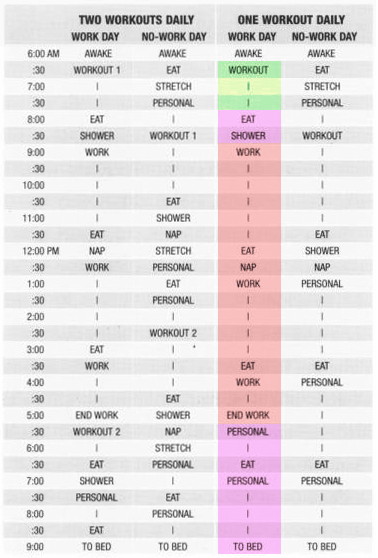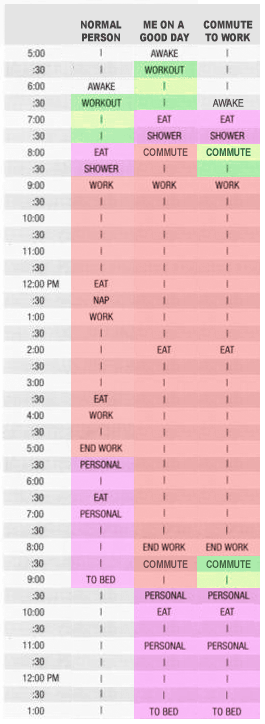I am going to enter some bicycle races this year.
I’m learning, however, that training to race can require a massive, life-altering level of commitment. Specifically, it requires huge amounts of time, time that a person like me might not realistically ever have. Is it possible for a business owner/entrepreneur to also be a competitive athlete?
This training schedule (below) comes from The Cyclist’s Training Bible by Joe Friel, a very popular training guide for serious cyclists. I’ve highlighted the book’s suggested weekday “One Workout Daily” schedule (the “Two Workouts Daily” schedules are too preposterous to even consider):

When I saw this, my heart sank. This is a schedule for someone who (a) works exactly 9-5, (b) doesn’t have any commute at all, (c) goes to bed at 9:00pm, and (c) scarfs down dinner. And let’s not even get into the NAP in the middle of the day!
I don’t know anyone who works 9-5 in New York City or in the Web industry. Not a soul. Most work 9-6 or 10-7, and most have at least a 30-minute commute to deal with as well. Plus, as a business owner, I generally have to be at work early and stay late. Sometimes, when we are on a strict deadline, I work extremely late.
And when I get home, I like to spend as much time as possible with my wife: watching movies, making dinner, talking. I also like to spend time working on personal projects and reading. Being something of an insomniac, staying up late is almost unavoidable.
So here’s what a realistic schedule would look like for me, both for days on which I can ride on my indoor trainer and for days on which I am able to bike to work (I can’t bike to work if the weather is bad, if I have a lot of stuff to carry, or if I have an important meeting for which I need to be well-dressed and fresh-smelling!):

Going to bed at 1:00am isn’t that abnormal for me — sometimes I stay up far later. And during crunch periods at work, days with early morning meetings, and days on which I have personal conflicts, I can’t use this schedule at all. If I want to race, I need to face up to the fact that I am getting something like 1/3 of the sleep that the other racers are getting. When I get dusted by the Cat-5 peloton, I suppose that I will at least have that as consolation.
What do other business owners and entrepreneurs do to stay fit, assuming that they work a little bit longer and put a little bit more energy into their work than most employees do? Perhaps they don’t train for competition, choosing instead for “maintenance” level training? I’d like to learn more about this.
Ultimately, though, I am confident. There is something very positive that I have discovered over the last year of cycling somewhat seriously: That incorporating exercise into an already jam-packed daily schedule tends to have a energizing effect, making me stronger and fitter, and giving me a kind of mental focus during the normal work day. Perhaps as I get fitter and more committed to cycling, my workday will become so ruthlessly efficient that maybe I can approach something resembling the “normal” schedule. I look forward to seeing how this works out.
Comments
6 responses to “Entrepreneur vs. Athlete”
I’m finding that cycling as my primary form of exercise (not even competitively) is taking too much time. It’s not that I don’t enjoy that time — I do — but the payoff in terms of fitness are poor compared to what I can get doing other forms of exercise. This is kinda depressing for me to realize as I’ve loved cycling all my life, but think it may be better relagated to transportation, commuting, and the occassional tour.
Entrepreneur vs. Athlete
At first I thought the title of your post implied that there was some sort of fantasy Ulitmate Fighting Championship match-up you had in mind. I would pay good money to see Michael Dell kick the shit out of Bode Miller.
Chris all I have to say is you frackin’ only live once. More power to you for giving this a go! You’re going to have massive tree trunk legs and a skinny upper body, though.
Hi Chris,
It’s the sport you’ve chosen that’s your problem. To train competetively for running a 10k, you rarely run more than 8 miles per day. If you’re doing interval training, you could work out for around two hours a day and still be in great shape.
Are you going to SXSW? We can go for a run on the lake. I’ve lost 20 lbs. since last year just running 30 minutes per day.
Truly good points regarding the benefit-per-minute value of cycling as a sport. The problem is that I frakking love cycling!! I love the speed, the ecological correctness, and the gearhead factor (finally, something to take apart and rebuild besides my motherboard!). I think I do it more for the pure fun of it, and the competitiveness, and not so much for the fitness. Although the fitness benefits are pretty great, too.
Running is of course the easiest option: If there’s less than an inch of snow on the ground, you have no excuse not to just put on the shoes and go! I was a competitive runner (800m and 1600m) back in high school before becoming a serious cyclist, but even back then my right knee preferred pedaling.
Of course, running is a lot cheaper, too.
Don’t get hung up on Friel in your first season. His is strictly a second- or third-season regimen. Just ride as much as you can, as hard and as smart as you can.
It helps if you don’t have a life. It also helps if you can commute to work, especially if it’s on a path uninterrupted by traffic. To get in 2-3 hours each day this winter, I’d watch a NetFlix movie on the trainer each morning, then commute to work, 30 minutes each way. (Demand that your boss — you? — install a shower at work, and keep a wardrobe at your office so you don’t have to schlepp it so much.)
I recommend a heart-rate monitor. It will keep you honest on your workouts, which will keep your training efficient. This was a second-season acquisition ofr me, and I was surprised to learn I wasn’t work nearly as hard as I thought I was.
However much you train, just have fun, no matter how — or if — you finish. I got dropped from every single 4/5 race I did my first year, but still had a ball.
You can survive in cat 5 on 5-6 hours a week (6-8 is preferable). Once you’ve got your base fitness, favor quality over quantity. Go for a long (2 hour ) group ride on Saturday and get in 3-4 one hour road or trainer sessions during the week with one or two interval sessions (google up “tabata protocol” for the ultimate time saving work out).
Take care of your diet and supplements and for God’s sake get some sleep! If you’re at Prospect Park this spring, look for the old man with the brown mustache and the black and yellow “Pro Pedals” team kit linin’ up for the Cat 4.
Good Luck!